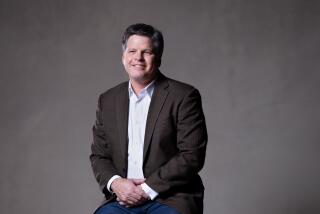Fast Gives Food for Thought on World Hunger
Two dozen teen-agers, hungry and tired, huddled together on the floor of a Pasadena church. Nearby were bamboo and palm leaf huts where some of the youngsters had slept the night before.
More than a day had passed since they last ate solid food, and now they were watching color slides of starving Ethiopians eating porridge fed to them by Christian missionaries.
Under the dimmed lights of the Sunday school room in the Lake Avenue Congregational Church, the teen-agers from the San Gabriel Valley were making a spiritual journey to Africa to learn what it means to be hungry.
The California sun shone bright and hot. The world outside seemed far away on what was definitely a beach day. Slide after slide showed the starkly outlined bones of the dying, and Nancy Bulcha of Granada Hills told the prosperous-looking teen-agers in T-shirts, shorts and sneakers about her experiences during two decades of working as a missionary nurse in Ethiopia.
May Be Worsening
“There’s a depression that hangs over you if you are a victim of famine,” she said. “Nothing goes smoothly.”
The slides, she said, were taken just over two years ago, not long before she left the east African country and returned to the United States. Although the famine had subsided, she said she is worried that the situation is worsening again.
As she spoke about drought, African politics and the church’s role, a head here and a head there nodded in understanding. In other rooms nearby, scores more youngsters were gaining some insight into hunger during a weekend of what the organizers called a “planned famine.”
With their stomachs as well as their imaginations, 150 teen-agers experienced “famine.” For 30 hours, from noontime last Friday to sundown Saturday, they fasted.
After school Friday, the young members of the Sierra Madre Congregational Church in Sierra Madre and the Lake Avenue Congregational Church showed up with their sleeping bags and Bibles in hand.
They also came with pledges of money to give to the hungry. “It’s just my way of helping out, you know,” said Darien Goehner, a 16-year-old member of the Pasadena church. Before beginning the fast he persuaded the 30 classmates in his San Marino High School speech class to pledge $1 each. He persuaded his parents, neighbors and friends to give even more.
The organizers are still seeking pledges in an effort to raise $30,000. Half of the money is to go to Monrovia-based World Vision, a nondenominational Christian agency that aids in relief and development activities in 85 countries. The other half is to go to Harambee Christian Family Center, another nondenominational group that offers literacy programs, summer camping and Bible studies for the northwest Pasadena community.
World Vision will take the student who raises the most money on a two-week missionary trip to the Dominican Republic and Haiti. Getting the pledges, Darien said, was the easy part. “I’m so hungry right now,” he said, his face pale. “It’s just draining everything out of me.” At noon on Friday he had eaten a turkey and cheese sandwich. Since then, he’d been drinking the apple juice, orange juice and water provided by church leaders.
The companionship of his friends, he said, lessened his hunger. Under the supervision of the leaders, Darien and the others prayed for help in learning compassion for the hungry. They watched films, played African games and created their version of an Ethiopian village.
“We’re trying to help them empathize with people,” said Patty Kelley of World Vision. “But there’s really no way . . . for kids like these to relate to the hunger situation in the Third World.” Still, she said, the weekend was one step toward helping them grow in their awareness.
The fasting caused Kristina Beck to think hard. At 17, she is a senior at Pasadena High School and belongs to the Sierra Madre Congregational Church. “I’ve been very fortunate, very lucky. I haven’t had to go without food, without water. I’ve always been able to get a good night’s sleep.”
Nearby, two boys were playing a rowdy duet on a piano in the hallway, and two others were taking turns scooting around on what looked like a cafeteria cart. Others were talking about how they would be glad to eat again in a few hours.
Kristina continued to speak above the noise made by her hungry friends. “I have a refrigerator full of food. I have a choice. (Ethiopians) don’t.”
The weekend reminded her about her only real experience with poverty, a trip she took with a church group to Mexicali. “You go down to L.A. and see so many homeless and they’re living on the street, but it really hits you when you see these little shacks in Mexicali. The size of my bathroom is the size of their houses. There’s sickness and disease and they don’t have any money.”
Late Saturday afternoon, when it was finally time to end the fast, Brian Anderson, youth leader for the Sierra Madre church, told the group that the Harambee Center had just learned some troubling news. A Pasadena mother and her three children had no money or food. Would the teen-agers consider giving their sandwiches to the family?
With only a few reluctant groans, dozens of the teen-agers agreed and cheered. Soon, they said, they could eat at a Jack in the Box or Burger King.
More to Read
Sign up for Essential California
The most important California stories and recommendations in your inbox every morning.
You may occasionally receive promotional content from the Los Angeles Times.









